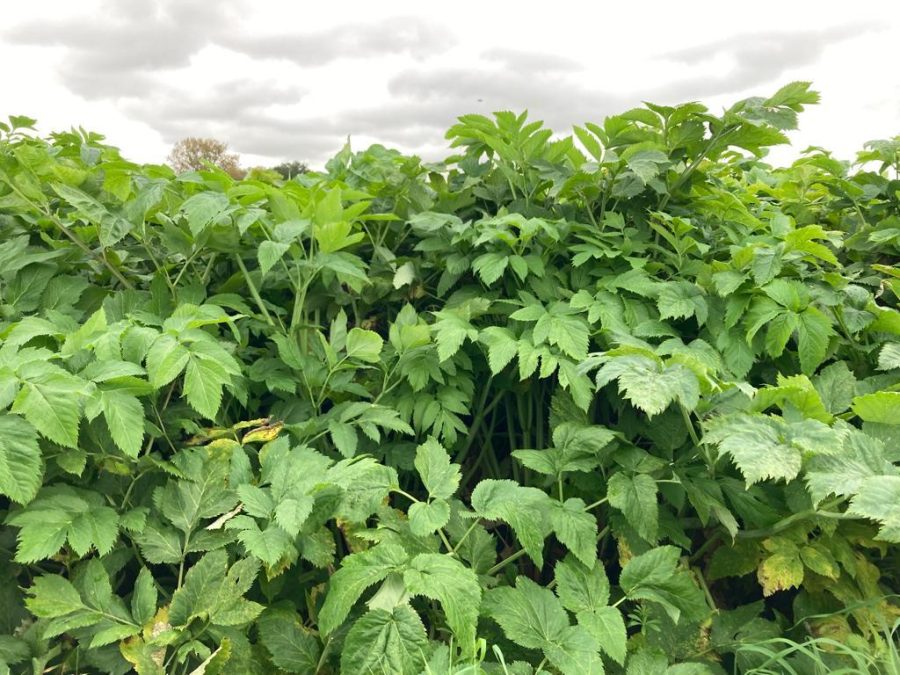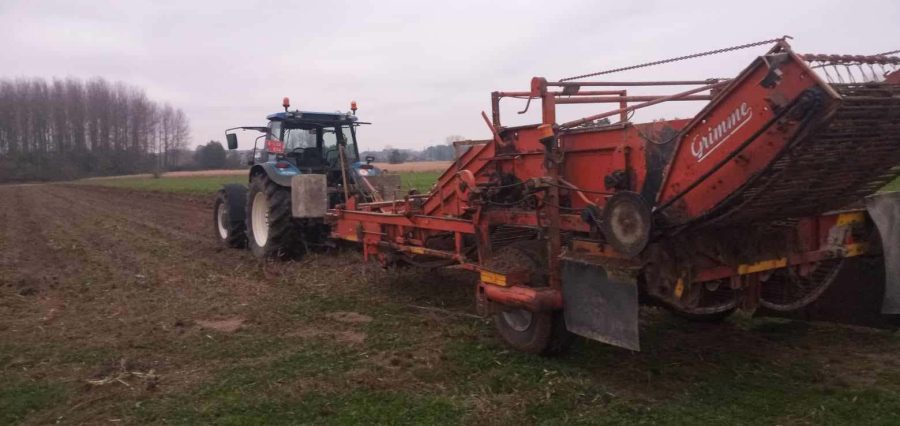Press release 34% of Flemish economy is bio-based and the share is growing rapidly. Pharma is leading the way.
The greening of the Flemish economy is accelerating. In 2020, 34% or one-third of the physical Flemish economy (i.e. excluding services) will be based on non-fossil raw materials. The pharmaceutical industry is leading the way with a biobased share that is already close to 50% in 2020. Green chemistry is also growing strongly (+24%). In five years, the total biobased economy grew three times as fast (+21%) as the traditional, physical economy (+6%). This is announced by Flemish Minister Jo Brouns, together with the B2BE Facilitator and ILVO during the harvesting of angelica root in Lessen. Angelica is an aromatic root crop with great potential for Belgian processor Sotecna, producer of essential oils with sales in the flavor and fragrance industry. Just under 10 hectares of the crop will be harvested in our country this year, but interest is growing among buyers and growers. Minister Jo Brouns sees in this the confirmation of the efforts in the Flemish policy on the bio-economy and wants the industry and agricultural sector to continue working on this.

Flemish Minister of Economy, Innovation, Work, Social Economy and Agriculture Jo Brouns: "With the bioeconomy policy plan, we and the Flemish government want to fully commit to this bio-based economy in which biomass and non-fossil raw materials are used to make products. We have built up strong expertise in this field in Flanders, and by investing an additional 10 million euros in research and innovation via the Flemish recovery plan, we were able to develop this further. We also started the B2BE Facilitator, for example, to strengthen the cooperation between the pharmaceutical and chemical industries with the agricultural sector. Many farmers are looking for alternative earning models. They are willing to experiment with new crops that provide the biomass the industry needs to move away from fossil resources. This is how we create a win-win. The new figures from the Bioeconomy Monitor show that it works and that the Flemish economy is increasingly using bio-based raw materials as a sustainable alternative."
Monitor of evolutions and trends within the Flemish bioeconomy
ILVO and VITO conduct an annual economic monitoring study of the bioeconomy in Flanders on behalf of the B2BE Facilitator and the Department of EWI. Based on figures from the German Nova Institute, the monitor accurately estimates the evolution of the bio-based part in the various bio-economic and 'hybrid' bio-economic sectors in Flanders. The annual update should record medium- and long-term evolutions and trends within the bio-based economy. In the 2023 update, based on data from 2019 and partly 2020, figures from the chemical sector were additionally explored.
Performance of biobased sectors increases in 2019-2020
Sectors with a significant share of biobased where most indicators - including value added, sales/production value, employment and labor productivity - are up from 2018 are agriculture, food, pharma and waste treatment. Among all bioeconomic sectors, pharma provides the second highest value added, with a rather low employment rate and thus very high labor productivity. The strong increase is reflected in the added value of both the biobased (+27%) and the entire pharma sector (+44%). The chemical sector also scores well. Dieter Cuypers of VITO: "We note an increase in the added value of the biobased parts of chemistry between 2016 and 2020 (+24%). But in contrast to pharma, the added value of the entire chemical sector drops by 10%."
Aroma-roots, an inspiring story
The figures were announced in Lessons on the Farm from Annelise Coessens, who has been pioneering aromatic roots for years. She grows angelica and horseradish for processing company Sotecna, which today extracts essential oils from them for the flavor or fragrance industry, but also has ambitions toward pharma.
In Belgium, 9.29 hectares of angelica were sown in 2022 that will be harvested this year - as angelica is a biennial crop. The Flanders’ FOOD cluster project Aroma-roots, with support from VLAIO, is also giving four Flemish farmers the opportunity to experiment with aromatic crops, accounting for 6.5 hectares of horseradish and 4.4 hectares of angelica root to be harvested next year. Several other farmers are watching from the sidelines, hoping to start growing the crop themselves soon. The fact that a Belgian processor is ready to take their roots is an extra incentive and provides income security.
Stef Lauwers, farmer from Sint-Katelijne-Waver: "The biggest advantage of the aromatic crops is the possibility of multivalorization. From all plant parts, aromas can be extracted that form the basis for perfumes, cosmetics, medication and also foodstuffs. With the tight profit margins for conventional crops as well as the changing climate, we as farmers are challenged to look for alternative and diverse revenue models. Moreover, I was looking for a rotational crop and aromatic crops lend themselves perfectly to this."
Stefaan Vandaele, CEO of Sotecna: "Until now, we imported most of our biomass, but the supply varies greatly. Going forward, we want to develop and embed more local knowledge and expertise."
It is the B2BE Facilitator who, at Sotecna's request, brought together researchers and experts from Boerenbond, Flanders' FOOD, ILVO and Praktijkpunt Vlaams-Brabant in Aroma-roots.
The B2BE Facilitator as a driving force
The B2BE Facilitator was established 2.5 years ago in the framework of the Flemish policy plan on bioeconomy to accelerate the development of the bioeconomy in Flanders. From the more than 100 ad hoc questions that have come in since then, it appears that matchmaking between buyers and suppliers of local raw materials is a success. Not only farmers, but also processors increasingly want to work with residual streams or biomass.
Jasmine Versyck, B2BE Facilitator: "We work out inspiring workshops thematically, we capture the needs from the field and offer answers to them with feasibility studies or targeted networking."
Ambitions toward a greener future
The Flemish government allocated 20 million euros in 2021 for research, innovation and cooperation between industry and agriculture. Dries Maes of Flanders Circular: "The bioeconomy policy plan was an indispensable stimulus and put the bioeconomy theme on the agenda. This also allowed Flanders to build a supported vision for the elaboration of the Flemish bioeconomy." This vision was translated into 6 working paths for the future by Flanders Circular's bio-economy working agenda. One example is "Fiber 2.0," which focuses on the expansion of fiber chains around hemp, flax or miscanthus for making construction more sustainable. Another work path is about developing bio-chemicals that contribute to a green Flemish chemistry. More about the work paths and related actions.
To the monitoring study
Contact
Hanna Van Renterghem | Communications, B2BE Facilitator Hannavanrenterghem@b2be-facilitator.beJef van Meensel | Expert in agricultural economics, ILVO Jef.vanmeensel@ilvo.vlaanderen.beJasmine Versyck | Business developer, B2BE Facilitator Jasmineversyck@b2be-facilitator.beEllen Martens | Innovation manager, Flanders’ FOOD Ellen.martens@flandersfood.com
